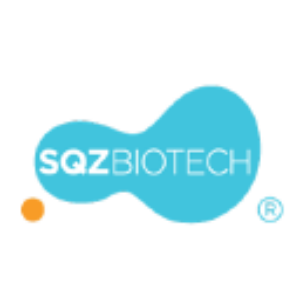SQZ Biotechnologies Announces First Autoimmune Disease Indication for Tolerizing Antigen Carrier (TAC) Platform
IND filing for Celiac Disease Anticipated in Third Quarter 2022
Clinical Translation Supported by Existing Red Blood Cell-Based Manufacturing Capabilities and Preclinical Models Demonstrating Treg Mediated Tolerance
“There is significant unmet need for patients with celiac disease. Its acute symptoms, potential for long-term complications, and necessity for a strict gluten free diet can all be extremely difficult,” said
SQZ TACs leverage the body’s natural mechanisms of red blood cell (RBC) clearance and antigen presentation to induce immune tolerance. TACs are derived from patient RBCs and are designed to carry disease-specific antigen cargos to specialized immune cells that are capable of inducing tolerance through multiple mechanisms.
Earlier this year, the company presented preclinical findings at the Antigen-Specific Immune Tolerance Digital Summit and the
“Our preclinical research has found that SQZ TACs can leverage physiological processes to induce T cell tolerance to disease-driving antigens through multiple mechanisms,” said
The company will leverage its rapid manufacturing system for the development of SQZ TACs. Earlier this year, the company presented clinical trial findings at the
About Celiac Disease
Celiac disease is a chronic autoimmune disorder that occurs in genetically predisposed people.1 2 The disease is triggered by eating foods containing gluten, which is found in wheat, barley, and rye. Disease symptoms can include abdominal pain, diarrhea, nausea, vomiting, and other common signs. When gluten is ingested the body mounts an immune response that attacks and damages the villi that line the small intestine, which can impact nutrient absorption.3 Many people who have celiac disease have not been diagnosed,4 however population-based studies indicate that the disease affects about 2 million people in
About SQZ TACs
SQZ TACs are a red blood cell-derived cell therapy platform being developed as an antigen-specific immune tolerance approach for autoimmune diseases. The platform is designed to leverage the natural process of RBC clearance by professional antigen presenting cells (APCs) in the lymphoid organs. This physiological mechanism is tolerogenic by default, instructing the immune system not to mount an attack. SQZ TACs are generated by squeezing RBCs with disease-specific antigens and are made to appear aged. SQZ TACs are designed to be rapidly engulfed by professional APCs and to act as a “Trojan horse” to present antigens in a non-inflammatory context, inducing tolerization of the patient’s T cells against the specific target. Preclinical data has demonstrated deletion and anergy of antigen-specific T cells as well as induction of disease specific Tregs capable of bystander suppression.
About
Forward Looking Statements
This press release contains forward-looking statements within the meaning of the Private Securities Litigation Reform Act of 1995. All statements contained that do not relate to matters of historical fact should be considered forward-looking statements, including without limitation statements relating to our platform development, manufacturing capabilities, product candidates, preclinical and clinical activities and outcomes, development plans and progress, clinical efficacy, regulatory submissions, therapeutic impact and market opportunities. These forward-looking statements are based on management's current expectations. Actual results could differ from those projected in any forward-looking statements due to several risk factors. Such factors include, among others, risks and uncertainties related to our limited operating history; our significant losses incurred since inception and expectation to incur significant additional losses for the foreseeable future; the development of our initial product candidates, upon which our business is highly dependent; the impact of the COVID-19 pandemic on our operations and clinical activities; our need for additional funding and our cash runway; the lengthy, expensive, and uncertain process of clinical drug development, including uncertain outcomes of clinical trials and potential delays in regulatory approval; our ability to maintain our relationships with our third party vendors; and protection of our proprietary technology, intellectual property portfolio and the confidentiality of our trade secrets. These and other important factors discussed under the caption "Risk Factors" in our Annual Report on Form 10-K and other filings with the
Certain information contained in this press release relates to or is based on studies, publications, surveys and other data obtained from third-party sources and our own internal estimates and research. While we believe these third-party sources to be reliable as of the date of this press release, we have not independently verified, and we make no representation as to the adequacy, fairness, accuracy or completeness of any information obtained from third-party sources.
________________________
1 Leonard MM, Sapone A, Catassi C, et al. Celiac Disease and Nonceliac Gluten Sensitivity: A Review. JAMA 2017;318:647-656
2
3 Beyond Celiac website (as of
4
5 Lionetti E, Gatti S, Pulvirenti A, et al. Celiac disease from a global perspective. Best Pract Res Clin Gastroenterol 2015;29:365-79.
6 Leonard MM, Sapone A, Catassi C, et al. Celiac Disease and Nonceliac Gluten Sensitivity: A Review. JAMA 2017;318:647-656
View source version on businesswire.com: https://www.businesswire.com/news/home/20210913005081/en/
SQZ Biotechnologies IR Contact:
investors@sqzbiotech.com
SQZ Biotechnologies Media Contact:
Corporate Communications
john.lacey@sqzbiotech.com
781-392-5514
Source:








